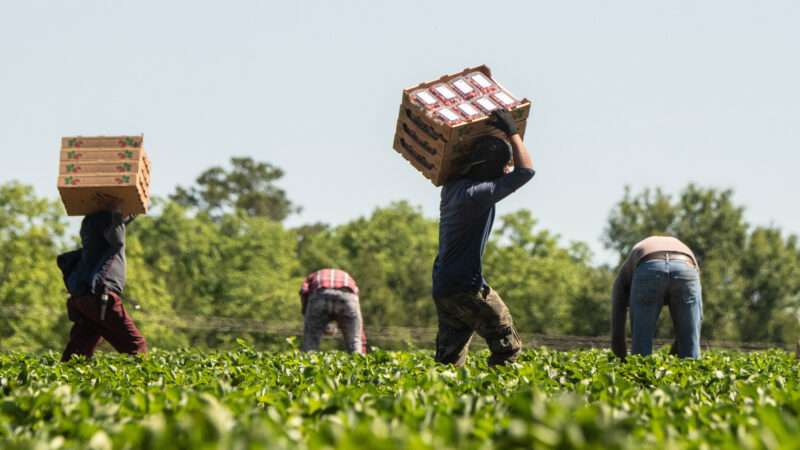
Food prices in the U.S. have ballooned alongside inflation, now up 10.4 percent over the past year. One solution to that issue may come in the form of an immigration bill that Republicans and Democrats in the Senate are now negotiating.
Known as the Farm Workforce Modernization Act, the measure was sponsored by Reps. Zoe Lofgren (D–Calif.) and Dan Newhouse (R–Wash.) and passed the House twice last year. It aims to improve the immigration mechanics behind the U.S. agricultural workforce, expanding legal pathways available to foreign workers and the domestic farmers who hope to hire them.
The ability to hire more agricultural workers translates into more helping hands for farmers and increased production of goods, which then means fewer food shortages and lower prices at the grocery store. “Consumers are seeing high costs of milk, produce, fruits, meat, and eggs in the supermarket because the Senate has not acted,” said Rebecca Shi, executive director of the American Immigration Business Coalition, in a press conference last week. Likewise, Newhouse expressed that the bill is an important step necessary to “fix our broken immigration system and combat the rising cost of food in our country.”
A broad coalition with multi-pronged interests backs the legislation. It attracted the support of 30 Republican representatives, over 250 farmers/producers associations, and over 100 organizations involved in immigration advocacy, labor, and economic growth.
The bill would establish a program for foreign agricultural workers “to earn legal status through continued agricultural employment.” That status would be contingent upon an individual working “at least 180 days in agriculture over the last 2 years” and would then be renewable if he or she performs farm work at least 100 days per year.
The legislation would also reform “the H-2A temporary agricultural worker program to provide more flexibility for employers, while ensuring critical protections for workers.” Particularly notable is a section that would help address the high demand for agricultural workers by “providing up to 20,000 H-2A visas per year (for 3 years) for dairy and other year-round agricultural employers,” “allowing the year-round H-2A cap to increase or decrease annually thereafter based on labor metrics” and worker shortages, and “increasing the number of green cards that are available for employer sponsorship.”
In its current form, the H-2A program puts farmers and foreign workers through an expensive and complicated process. The program has over 200 rules, and according to a 2014 study by the American Farm Bureau Federation, “72 percent of growers reported that workers arrived” an average of 22 days after the date they were needed—a critical delay in agricultural work. That study also found that “farmers and even professional H-2A agents are routinely forced to hire lawyers” to navigate the process. And because it’s so difficult to secure legal status, only a small share of foreign agricultural workers actually do. As of last year, under 10 percent of all farmworkers in the U.S. were H-2A visa holders. Roughly half of all hired crop farmworkers are undocumented.
“Increasing legal pathways like H-2A will ease pressure on the southern border by decreasing the number of individuals—particularly single adults—who seek to cross without authorization, all while filling critical labor needs,” says Danilo Zak, policy and advocacy manager for the National Immigration Forum. “Passing this bill would demonstrate what real bipartisan compromise on immigration can look like in 2022: An earned pathway to status for a targeted undocumented population paired with proper and effective enforcement of the system.”
A sticking point in Senate negotiations over the bill, according to NPR, has been a provision in the House version that would allow H-2A workers to sue their employers if they think they’ve broken labor laws. Proponents of the bill argue that it already outlines ample protections for migrant workers.
Those deliberations may delay passage, and the upcoming midterms may change the balance of support. Still, at a time when even incremental immigration measures are polarizing, the bill represents a bipartisan agreement that immigration reform can help alleviate some of the country’s most pressing problems.
The post Better Immigration Laws Could Help Lower Food Prices appeared first on Reason.com.
from Latest https://ift.tt/pEMULJx
via IFTTT